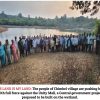Goa is abuzz with excitement as vintage bike and car owners, users, collectors and fans are decking […]

Save Our Democracy! “Unka Sankalp, Vipareet Bharat” “Sab ka naash, Sab ka Vinaash” ! ELECTORAL BONDS REVELATION USELESS! By Aravind Bhatikar
Democracy, Mar 16- Mar 22 2024 March 15, 2024March 13, 2024
By Aravind Bhatikar
THE data on electoral bonds released by the State Bank of India to the Election Commission of India, due to an ultimatum issued by the Constitutional bench of the Supreme Court, is practically useless when it comes to nailing the mega-corruption of the BJP. The electoral bonds scheme, passed as a part of the Finance Bill in 2017 and implemented from 2018 onwards, is a Rs16,000 crore mega-scam with possible quid pro quo arrangements between political parties and some big corporate beneficiaries. The judgment of the Constitutional bench and the subsequent hearing on the contempt petition filed by the ADR against the SBI, would have been useful to expose the corruption introduced by the BJP in 2017, if the Supreme Court had insisted that the SBI should match the data on the purchase of bonds with the encashment of bonds by political parties.
The Supreme Court’s failure to take its intervention to a logical conclusion is unfortunate. To the extent that the data available in public domain on March 15 can be quickly deciphered to expose ruling party’s corruption and the Supreme Court can be credited with efforts to cleanse our politics.
Information on the names of donors, value of their bonds and total contribution made by them to various political parties, should be available within a few days. Software experts have publicly declared that the required matching and compilation would not need more than a day’s work. However, nearly saying that big well known corporates have contributed thousands of crore to BJP party fund cannot constitute corruption, unless a nexus is established between raids conducted by the ED and CBI on these corporates or the tax rebates given to such corporates, or writing-off of huge loans given to them by the banking system.
Two news portals viz News Minute and News Laundry have released their research findings that between 2018 and 2023, 30 registered companies, which were raided by the ED, contributed Rs335 crore to the BJP party fund.
Figures of corporate loans written off range between Rs15 lakh crore and Rs25 lakh crore. We can be sure that big corporates which have managed to get huge loans written off would have contributed substantially by way of electoral bonds to the political party of their choice, or, better still, the political party which has a quid pro quo arrangement with them.
Politics is a battle of perceptions. The very fact that the State Bank of India wanted time till June 30 to release the matched data to the ECI, exposes the reluctance of the BJP government to make the information public before the Lok Sabha election. The plea of the SBI asking for time till June 30th is itself an indication that huge quid pro quo’s need to be kept under cover till Lok Sabha elections get over.
The Congress and other Opposition parties, whether they are a part of the I.N.D.I.A. or not, should learn from the BJP how to build perceptions even around issues which don’t exist. The Supreme Court has placed a huge issue in the hands of the Opposition parties. They should use this opportunity to expose the BJP.
















